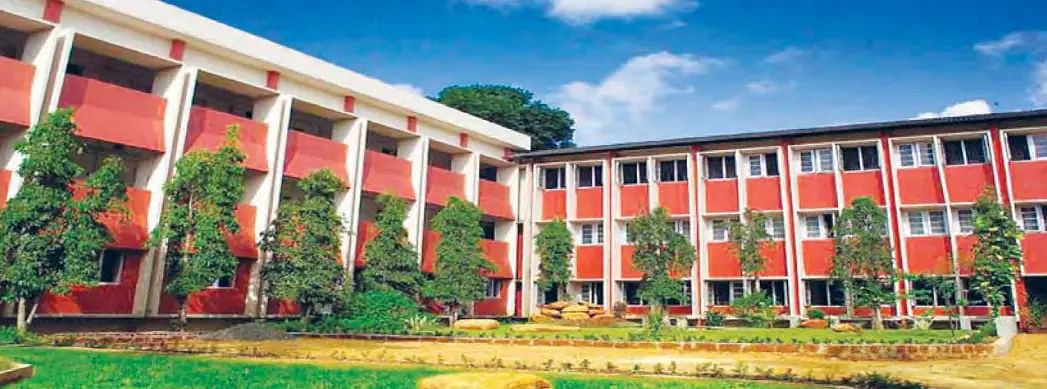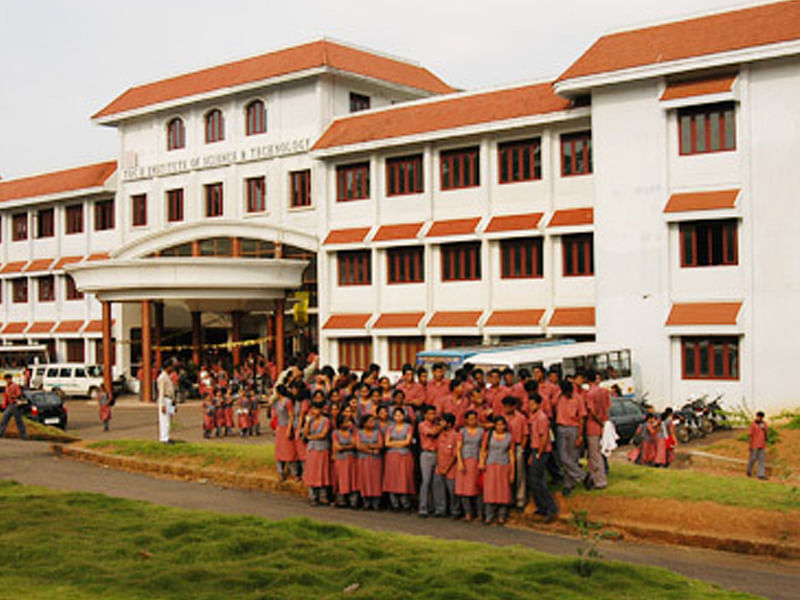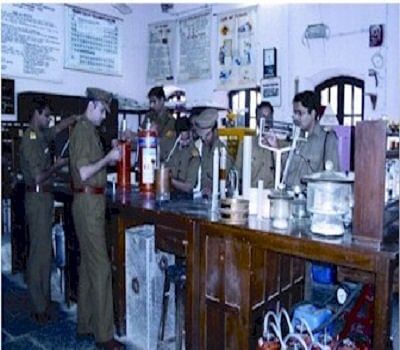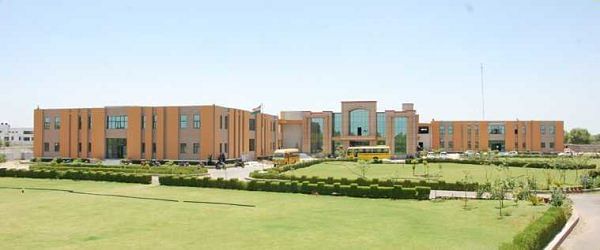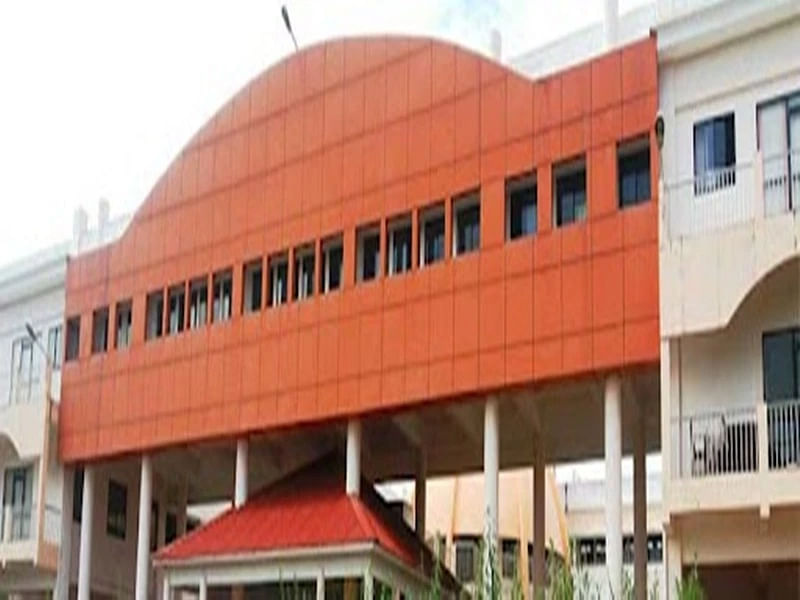B.Tech Safety and Fire Engineering: Course Details, Eligibility, Fees, Admission
B.Tech Safety and Fire Engineering is a four-year undergraduate engineering course that aims at educating students to plan building safety, fire exits, and alarms while constructing the building and implementing new innovative ideas and creative plans. The course is the study of safety measurements, prevention of fire accidents, precautions to control fire, etc. Graduates upon completing this course are entitled to receive numerous job opportunities in both the public and the private sector as safety managers, safety trainers, risk managers, etc.
Table of Contents
- About B.Tech Safety and Fire Engineering
- Eligibility Criteria for B.Tech Safety and Fire Engineering
- How to Get Admission for B.Tech Safety and Fire Engineering?
- Popular Entrance Exams for B.Tech Safety and Fire Engineering
- Top B.Tech Safety and Fire Engineering Colleges in India
- Fee Structure for B.Tech Safety and Fire Engineering
- Syllabus and Subjects for B.Tech Safety and Fire Engineering
- Why Choose B.Tech Safety and Fire Engineering?
- Preparation Tips for B.Tech Safety and Fire Engineering Course
- Scope of Higher Education for B.Tech Safety and Fire Engineering
- Salary of B.Tech Safety and Fire Engineering Course
- Career Options After B.Tech Safety and Fire Engineering
- Skills That Make You The Best B.Tech Safety and Fire Engineer
B.Tech Safety and Fire Engineering Course Details
| Degree | Bachelors |
| Full Form | Bachelor of Technology in Safety and Fire Engineering |
| Duration | 4 Years |
| Age | No age limit |
| Minimum Percentage | A minimum of 50% average marks in graduation |
| Average Fees | ₹1 - 3 LPA |
| Similar Options of Study | Diploma in Safety and fire department, Bachelor of Science fire and Safety |
| Average Salary | INR 2.5 LPA (Source: PayScale) |
| Employment Roles | Fire and Safety Officer, Planning and Design Specialist, Fire and Safety Consultant, Safety Instructor, Safety Supervisor, Fire and Safety Engineer, Risk Assessor |
About B.Tech Safety and Fire Engineering
As per Wikipedia, "Fire protection engineering is applying science and engineering principles to protect people, property, and their environments from the harmful and destructive effects of fire and smoke. It encompasses engineering which focuses on fire detection, suppression and mitigation, and fire safety engineering, which focuses on human behavior and maintaining a secure environment for evacuation from a fire."
B.Tech Fire and Safety Engineering syllabus cover accident investigation and analysis, safety in an electrical system, accident prevention principles, security in rail and road transport, safety in the engineering industry, environmental monitoring and control, etc. B.Tech Safety and Fire Engineering graduates have an excellent job scope in India in government firefighting departments, oil companies, refineries, chemical plants, industries, electricity boards, fire safety training institutes, etc. Listed below are a few tools and equipment used by B.Tech Safety and Fire Engineers aspirants:
- Fire Extinguishers
- Fire Alarm System
- Smoke Detector
- Fire Sprinklers
- CT Lab
- Optris PI Thermal
- CAE Thermal Fluid Analysis
Eligibility Criteria for B.Tech Safety and Fire Engineering
Admissions for the B.Tech Safety and Fire Engineering course depend on the eligibility criteria, including a minimum cut-off of 40% - 45% in maths, physics, chemistry, biology in the 10+2 HSC board exam. Apart from that, students are required to clear any national or state-level entrance examination for admissions into premier universities. Students must have obtained a diploma degree (10+3) in the safety and fire program for gaining lateral entry.
How to Get Admission for B.Tech Safety and Fire Engineering?
The admission process in top B.Tech Safety and Fire Engineering colleges requires aspirants to clear the eligibility criteria prescribed by UGC and their desired university. For admissions via merit quota, students need to clear any state or national-level entrance exams and a group discussion (GD)/personal interview (PI), using which students are selected. The cutoff scores are calculated for the students, a culmination of entrance exam score, GD score, and 10+2 score. The university will use them to offer seats for deserving students. Apart from the merit quota, students are admitted via management quota, which involves capitation fees for admissions. The course falls under the umbrella of the B.Tech course and therefore, follows a similar admission procedure.
Apply for the Course
National-level exams provide only online applications. Other colleges and universities offer either online or offline applications. Students should check the college's admission process by visiting the respective college or university website.
Selection Criteria
Colleges or universities have a particular percentage of management seats for which the management committee decides the selection criteria. University releases a score list of cut-off scores to be qualified. The seat allocation is based on the cut-off score in WAT/GD/PI and the standard board exams core subject’s average percentage.
Read More on B.Tech Admission
Popular Entrance Exams for B.Tech Safety and Fire Engineering
Universities or colleges have standard entrance exams and cut-off scores to get admission. These exams test the aspirant’s knowledge and abilities. Below are a few standard university-level, state-level, and national-level entrance exams for admission in B.Tech Safety and Fire Engineering courses:
A Quick Glance at the B.Tech Safety and Fire Engineering Entrance Exams
There are many entrance exams available to qualify aspirants’ ability to pursue the B.Tech Safety and Fire engineering course. But there are few common points between all of these exams. Listed below are few things common about all engineering entrance exams:
- The entrance exam duration will be around 3 - 3.30 hrs.
- The exam will be either online or offline.
- There will be MCQ or Non-MCQ Questions.
- Check if the exam has negative marking.
- There are five exam sections, including English, chemistry, mathematics, physics, and general aptitude.
Top B.Tech Safety and Fire Engineering Colleges in India
Top B Tech Fire and Safety Engineering colleges in India are listed below, according to NIRF:
| Ranking | Colleges |
| 15 | VIT Vellore |
| 84 | Chandigarh University |
| 114 | New Horizon College of Engineering Bangalore |
| 116 | Cochin University of Science and Technology Kochi |
| 117 | Jain University Bangalore |
| 181 | Chitkara University Punjab |
| 251 | Sikkim Manipal Institute of Technology East Sikkim |
Fee Structure for B.Tech Safety and Fire Engineering
There are only a few limited colleges that provide B.Tech Safety and Fire Engineering courses in India. B.Tech Safety and Fire Engineering course fees range from INR 1 - 3 Lakhs. Top 5 B.Tech Safety and Fire Engineering college fees structure is mentioned here:
| Colleges | Total Fees Structure |
| Vellore Institute of Technology, Vellore | INR 1.98 LPA |
| Chandigarh University. Chandigarh | INR 1.34 LPA |
| New Horizon College of Engineering, Bangalore | INR 2.50 LPA |
| Chitkara University, Punjab | INR 1.34 LPA |
Syllabus and Subjects for B.Tech Safety and Fire Engineering
B.Tech Safety and Fire Engineering course is a four-year course with eight semesters. It is mandatory to complete core, electives, lab practical, and project to obtain the degree. Apart from academic studies, survey, seminar, viva, quiz, research paper publication, and internship encourage the aspirant's knowledge about the course. Important B.Tech Safety and Fire Engineering subjects are listed below:
- Firefighting Equipment
- Search and Rescue Techniques
- Accident Investigation
- Special Fire Hazards
- Explosion and Fire Dynamics
- Fire Safety Risk Assessment
- First Aid
- Fire Engineering
- Environmental Engineering
- Chemical Process Safety
- Safety Engineering
- Fire Protection Systems
- Industrial Safety Management
- Town Planning
- Disaster Management
Read More: B. Tech Safety and Fire Engineering Syllabus and Subjects
Why Choose B.Tech Safety and Fire Engineering?
B.Tech Safety and Fire Engineering students study risk assessment, planning infrastructure, and understanding fire prevention concepts. Let us learn about "why choose B.Tech Safety and Fire Engineering?" with three simple questions:
What is B.Tech Safety and Fire Engineering All About?
B Tech in Fire and Safety Engineering is a four-year undergraduate engineering course that offers the study of safety techniques and upskills students to be a professional in fire safety engineering by analyzing, planning, designing, implementing fire safety measures during construction. The course deals with safe house planning, residential apartment planning, town planning, office infrastructure planning, fire prevention in the chemical industry, emergency communication systems, disaster management, and so on. The syllabus includes subjects like fire prevention, protection measures, heat Transfer, combustion and explosives, and much more that offer a basic idea of safety design and precautionary methods. Upon completing the course, graduates have a variety of career scopes and job opportunities across the public sector and private sector.
What Does a B.Tech Safety and Fire Engineer Do?
Fire safety engineers are responsible for inspecting whether the safety protocols are followed while the building is constructed. They also examine the site, building, industry, factory, plant, etc., periodically to ensure the safety measures are followed properly. Following are some tasks performed by B.Tech Fire and Safety Engineers:
Work Process: B.Tech Safety and Fire Engineers analyze the possibility of fire accidents, plan & design prevention of fire accidents. In case of emergency or disaster, they use their professional skill to rescue and precautions to save people.
Creativity: Fire safety engineers use their imagination and innovation to incorporate and implement new safety measures to prevent fire accidents and rescue people in an emergency.
Multitasking: Besides planning, rescuing, and making arrangements for emergency first-aid, explosive detection, firefighting, search and detect people stuck inside, fire investigation, etc., are also part of fire safety engineers' work.
Reasons Why B. Tech Safety and Fire Engineering Course Can Fetch Students a Rewarding Career?
B.Tech Safety and Fire Engineering is a vital engineering stream that guarantees students' careers in top government departments and private organizations. Following are some of the points about a career in fire and safety:
High Paid Job Roles: Students pursue B.Tech Safety and Fire Engineering courses because they are likely to get highly paid jobs in the government sectors. The basic salary for B.Tech Safety and Fire Engineering graduates is around INR 2.16 – 6.34 LPA.
Demand in Government Sectors: There is more demand for fire safety engineers in the government fire office division for fire safety officers, firefighters, fire safety supervisors, fire safety counselors, etc.
Placement Opportunities: B.Tech Safety and Fire Engineers have numerous job opportunities. Here are a few job roles of B.Tech Safety and Fire Engineers:
- Fire Protection Engineer
- Fire & Safety Consultant
- Fire Safety Officer
- Fire Safety Engineer
- Risk Management Consultant
- Planning and Design Specialist
- Safety Inspector
Read More: B. Tech Safety and Fire Engineering Jobs and Scope
Preparation Tips for B.Tech Safety and Fire Engineering Course
Before starting the academic training, students should understand their course curriculum, job scope, higher education options, skills required to be the best professional, etc. Students may research online, analyze research / IEEE papers, watch related videos, read blogs, etc. Following are some tips to prepare for the course:
Self-Study Plan: Create a self-study plan by splitting the syllabus into three levels, such as easy, moderate, difficult, and assign different time frames for each topic. Follow the time slots strictly.
Stay Focused: Students should not let any deviation distract them. Even if there is such an inevitable situation, try to manage and reschedule.
Develop Innovation and Creativity: To be the best safety and fire engineer, a graduate needs to develop their creativity, innovation, and instinct to inspect and detect the possibility of disaster.
Proper Notes: Once the academic syllabus is received, students should refer to the recommended textbook and have detailed notes for all subjects that will make revision easy.
Know About New Technologies: It is important to know about all the new technologies, equipment, techniques, and strategies available. This will help students get placed in a top company.
Scope of Higher Education for B.Tech Safety and Fire Engineering
B.Tech Safety and Fire Engineering has multiple higher studies options. After B.Tech Safety and Fire Engineering course, graduates can go for M.Tech in Safety and Fire Engineering or pursue M.Phil in Thermal Energy or Fire Science and continue doing Doctor of Philosophy (Ph.D.) Safety and Fire Engineering. Many other research and certification programs are also available to enhance safety and fire engineering course knowledge. The list of courses aspirants can do after B.Tech Safety and Fire Engineering are:
- M.Tech Safety and Fire Engineering
- Ph.D. in Safety and Fire Engineering
- MBA in Safety and Fire Engineering
- NTTF
- CAD Course
- Research Specialisation in Safety and Fire Engineering
- R & D in industries.
- Project Management Professional Course
- MS in Safety and Fire Engineering
- Personality Development Course
Salary of B.Tech Safety and Fire Engineering Course
B.Tech Fire and Safety Engineering graduate's average salary is INR 2.5 LPA, based on the graduate's knowledge. When graduates go abroad to continue their careers, freshers earn around INR 18 – 30 LPA and experienced earns around INR 30 - 60 LPA.
Read More: B. Tech Safety and Fire Engineering Salary
Career Options After B.Tech Safety and Fire Engineering
B.Tech Safety and Fire Engineering graduates have massive openings in government firefighting departments, oil companies, refineries, chemical plants, electricity boards, fire safety training institutes, construction firms, armed forces, energy firms, safety consultancies, etc. B.Tech Safety and Fire Engineering graduates invent new technologies and prevention methods. Here the list of top recruiting companies:
- CTS
- Amazon
- Infosys
- Westin Hostels
- Ankur Palm Spring Apartments
- Walmart
- Accenture
- Hyatt Hotels
- ISRO
Skills That Make You The Best B.Tech Safety and Fire Engineer
The essential skill required to be a safety and fire engineer is to detect if something is wrong. The safety inspector should be capable of analyzing the area entirely and see the possibility of fire accidents. Besides that, bravery and courage are more critical for safety engineers to escape and save people at the time of disaster. Also, aspirants should identify their strengths and weaknesses and work on their shortcomings. Here are a few skills to develop to become the best safety engineer:
- Teamwork and Collaboration
- Leadership Qualities
- Decision-Making
- Problem-Solving
- Time Management
- Multitasking
- Attention to Details
- Quick Action
- Positivity
- Bravery
- Communications Skills
- Strong Professional Ethics
- Physical Fitness
Check other important B.Tech Courses
